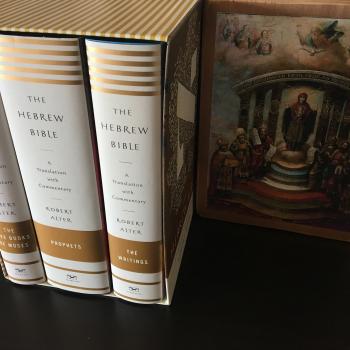You could say that Trinity Sunday is a day of curses. Traditionally, after all, it is the day to say the Athanasian Creed, the Quicunque vult, as it’s known in some circles. Here it is in its full English translation, as it is in the 1979 Book of Common Prayer (as in the Episcopal Church’s prayerbook), with all of its anathemas unadulterated:
Whosoever will be saved, before all things it is necessary that he hold the Catholic Faith.
Which Faith except everyone do keep whole and undefiled, without doubt he shall perish everlastingly.
And the Catholic Faith is this: That we worship one God in Trinity, and Trinity in Unity, neither confounding the Persons, nor dividing the Substance.
For there is one Person of the Father, another of the Son, and another of the Holy Ghost.
But the Godhead of the Father, of the Son, and of the Holy Ghost, is all one, the Glory equal, the Majesty co-eternal.
Such as the Father is, such is the Son, and such is the Holy Ghost.
The Father uncreate, the Son uncreate, and the Holy Ghost uncreate.
The Father incomprehensible, the Son incomprehensible, and the Holy Ghost incomprehensible.
The Father eternal, the Son eternal, and the Holy Ghost eternal.
And yet they are not three eternals, but one eternal.
As also there are not three incomprehensibles, nor three uncreated, but one uncreated, and one incomprehensible.
So likewise the Father is Almighty, the Son Almighty, and the Holy Ghost Almighty.
And yet they are not three Almighties, but one Almighty.
So the Father is God, the Son is God, and the Holy Ghost is God.
And yet they are not three Gods, but one God.
So likewise the Father is Lord, the Son Lord, and the Holy Ghost Lord.
And yet not three Lords, but one Lord.
For like as we are compelled by the Christian verity to acknowledge every Person by himself to be both God and Lord,
So are we forbidden by the Catholic Religion, to say, There be three Gods, or three Lords.
The Father is made of none, neither created, nor begotten.
The Son is of the Father alone, not made, nor created, but begotten.
The Holy Ghost is of the Father and of the Son, neither made, nor created, nor begotten, but proceeding.
So there is one Father, not three Fathers; one Son, not three Sons; one Holy Ghost, not three Holy Ghosts.
And in this Trinity none is afore, or after other; none is greater, or less than another;
But the whole three Persons are co-eternal together and co-equal.
So that in all things, as is aforesaid, the Unity in Trinity and the Trinity in Unity is to be worshipped.
He therefore that will be saved must think thus of the Trinity.
Furthermore, it is necessary to everlasting salvation that he also believe rightly the Incarnation of our Lord Jesus Christ.
For the right Faith is, that we believe and confess, that our Lord Jesus Christ, the Son of God, is God and Man;
God, of the substance of the Father, begotten before the worlds; and Man of the Substance of his Mother, born in the world;
Perfect God and perfect Man, of a reasonable soul and human flesh subsisting;
Equal to the Father, as touching his Godhead; and inferior to the Father, as touching his Manhood.
Who, although he be God and Man, yet he is not two, but one Christ;
One, not by conversion of the Godhead into flesh but by taking of the Manhood into God;
One altogether; not by confusion of Substance, but by unity of Person.
For as the reasonable soul and flesh is one man, so God and Man is one Christ;
Who suffered for our salvation, descended into hell, rose again the third day from the dead.
He ascended into heaven, he sitteth at the right hand of the Father, God Almighty, from whence he will come to judge the quick and the dead.
At whose coming all men will rise again with their bodies and shall give account for their own works.
And they that have done good shall go into life everlasting; and they that have done evil into everlasting fire.
This is the Catholic Faith, which except a man believe faithfully, he cannot be saved.
This is pretty stern stuff. On first glance, you might say that it sounds extremely exclusionary, so exclusive that one wonders what it’s also doing on the inclusive Evangelical Lutheran Church of America’s website.
But saying the Quincuque vult on Trinity Sunday makes me think about this: what happens if we misuse the doctrine of the Triune God?
After all, the Athanasian Creed keeps pretty close to how we got a Triune God in the first place. The point is, after all, that Jesus was identified with God by the earliest of early churches, that Jesus prayed to a Father who was also God, and that Jesus and the apostles spoke of a Holy Spirit whose identity as the Paraclete was spoken of as a person. You see this at the end of the Athanasian Creed, where after you get all sorts of mysterious affirmations and anathemas about what the nature of personhood in the Trinity is, you get a treatment also of Jesus’ hypostatic union as fully God and fully human.
So far, so good.
But like all doctrines that have developed in the church, you could say that the Trinity, when used badly, is a curse on the church. This is an especially important point on Trinity Sunday, the Sunday that opens to us the weeks of Ordinary Time leading to Advent. During Ordinary Time, we live our lives as a spiritual exercise of living life in what’s classically known as the saeculum, the ‘secular’ time where we conduct lives in the midst of the world.
To live in that time, we are often given models of how to live, some of which purport to model our lives after the triune nature of God. While Augustine’s De Trinitate has an amazing treatment of the psychological triunity of humans as the image of God, there are some that are particularly unhelpful, such as Watchman Nee’s tripartite division of the self into body, soul, and spirit, after which he condemns the body and the soul so as to only focus on the spirit, purging ourselves of fleshly desires. Suppose one followed Nee during ordinary time, hating one’s body and ‘soulish’ ambitions to life, always examining ourselves to beat ourselves into more humility while detaching ourselves from attachment to the world in the effort to make ourselves more holy. Apart from the fact that we might literally go crazy, this morbid understanding of Christian life doesn’t sound entirely right in light of the incarnate reality that is Christianity. Or take also marriage and the thoroughly unhelpful analogy of the triangle that substitutes husband for ‘Son’ and wife for ‘Holy Spirit’ and alleges that as we walk closer to God, we get closer to one another. In an act of subordinationism, this model can also be used to subordinate the wife to the husband and thus justify all manners of sexism. While this trinitarian analogy sounds very pious, it negates the whole point of marriage as a sacrament, that in our marital interactions, we as spouses mediate graces to each other. It’s as if by focusing on an unmediated God to the exclusion of each other, somehow, we’ll grow mystically closer to one another. I don’t know about your spouse, but I don’t think my wife would like that very much.
However, even as I call foul on these examples (I’m sure there are many more), the fact that we have an Athanasian Creed might mean that I find myself on dangerous ground and hot water. It could be said that if I think these models of life don’t have to be normative Christian models because they are theologically unsound, then I have denied a Trinitarian pattern for our lives.
But here, I suggest, is where the Athanasian Creed helps us. The Quincuque vult does not give us a trinitarian model of life. It articulates the mystery of the Trinity in light of the Son’s hypostatic union. That’s all it does, neither affirming the unhelpful models that I’ve presented nor denying some helpful trinitarian models that might be floating around out there.
So next time someone gives us a Trinitarian model of life that we can import into the saeculum, perhaps we should ask some critical questions. Perhaps we could ask if what is presented to us has anything to do with the self-giving obedience of the Son to the Father. Perhaps we could ask if what we’re being asked to follow draws us into participation in the mysterious hypostatic divine-human nature of Christ. Perhaps we could ask whether we are being asked to contemplate more fully the mystery that we worship a God who reveals himself in Jesus Christ as three in one and one in three, a God whose three persons reaches out to us and draws us into his eternal life.
For if we follow these models of life purportedly modeled on the Trinity but miss the Son, we are cursed indeed. After all, by doing so, we have secularized the Trinity, co-opted the Triune God to justify our models of life instead of opening ourselves, as Gregory of Nyssa puts it, to the work of the Father who sends the Son and the Spirit to draw us to participate in his divine nature. That would be, after all, the summation of the curses of Trinity Sunday, to deny the ‘catholic faith’ by inventing our own god and shunning the catholicity of life given to us by God through the Son, who is the exegesis of the Father.
On this Trinity Sunday, then, we remember that we have not merely been given a model of life to follow as we live life in the saeculum. No, we have been given God himself.











